Cricket elections and Yahapalanaya
View(s):On January 8, 2015, hopes of ‘Yahapalanaya’ loomed large over the Democratic Socialist Republic of Sri Lanka. On that day of planetary change, most Sri Lankans thronged polling stations to cast their vote for change, and a new era was born — or was it?
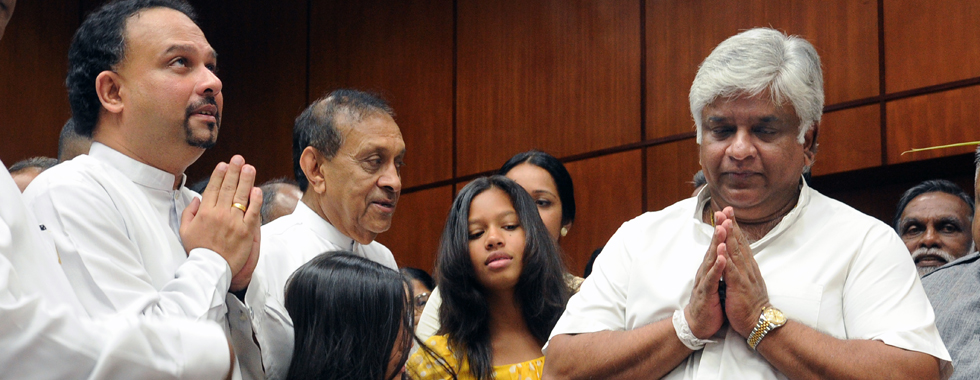
What would be Ministers Navin Dissanayake and Arjuna Ranatunga wishing for?
Besides national elections, there is another election that begs the attention of most Sri Lankans. That is the election to choose office bearers of Sri Lanka Cricket – the official body that governs the game in Sri Lanka. So much so, even in Australia, where I am stationed at the moment, the topic is being hotly discussed in cricketing circles — with a kind of interest seen ahead of a general election.
Yet, looking at it from an independent angle, can we say our cricket elections have been held democratically? Can we say the system has been unflawed or void of political interference?
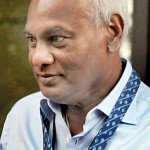
Upali Dharmadasa
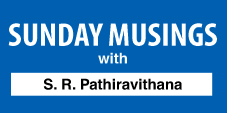 Cricket elections are due to be held on April 30, with the nominations being called from tomorrow.
Cricket elections are due to be held on April 30, with the nominations being called from tomorrow.
Way back in 1973, ‘the Sports Law’ was introduced by the then Sports Minister, K.B. Ratnayake, to arrest certain unpleasant developments. It was done with all good intentions. But, as time passed by and Sri Lanka’s sports, especially cricket, and athletics to a lesser degree, drew international attention, various Sports Ministers brought in changes to the law to gain more control of the sports – especially cricket and athletics.
However the most affected by the ludicrous machinations has been cricket – by far the most successful game in the sports history of our country. For instance, leave alone a team that is travelling abroad, even a replacement to an
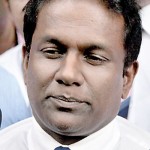
Thilanga Sumathipala
injury needs to be approved by the Sports Minister. Why? What technical details does a sports minister know about a cricketer’s injury or the replacement? So far what has happened is that the minister has dhobi marked the selectors’ call. For instance, during the just concluded World Cup, the Lankans replaced bowlers with batsmen and vice-versa, still the changes were effected to the call of the selectors – may be without any questions.
Yet, also there have been occasions when the political regime has even gone above the sports law. It was not long ago that the Lankan cricket had a spate of interim committees to govern the game. It was a convenient situation for the sports ministers or even the governments. The interim committees became a tool to please their respective political stooges or benefactors.
There was even an occasion when once Interim Committee chairman Jayantha Dharmadasa resigned from his position enabling President Mahinda Rajapaksa to gain a crucial parliamentary vote with a cricketing pooja.
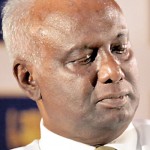
ayantha Dharmadasa
Then there was an occasion when the then sports minister, Gamini Lokuge, under the provisions of the Sports Law took charge of Sri Lanka Cricket, and worked out a TV deal before another Interim Committee took over.
At this point, not only in Sri Lanka, but also in several Test-playing nations, political interference in the game had become a serious problem. The International Cricket Conference (ICC), the world body, did not like what was happening and decided to crack the whip, ordering its members to revert to the democratic process.
In Sri Lanka it happened, but not in the manner it was required. First Upali Dharmadasa and Nishantha Ranatunga, the chairman and the secretary of the last Interim Committee, were airdropped to the positions of president and secretary. A year later Upali’s brother Jayantha and Nishantha Ranatunga were airdropped to the two vital positions. Yes, the rest of the positions were duly elected.
Then came the crunch. Nishantha Ranatunga who had been the secretary for a very long time, decided that it was his turn at the big chair in cricket. With both Dharmadasa and Ranatunga working towards this common goal, the atom split in two.
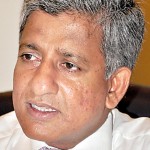
Nishantha Ranatunga
Initially it was a very subdue Jayantha Dharmadasa who let the world go by while he was lilting at the top. This gave the opportunity for the ambitious Nishantha Ranatunga who also had a lot of political clout to consolidate his position as the main driver of the sport in the country. He became strong, but he also earned a few enemies on the way – they came in various forms.
Then, once Ranatunga’s final goal came to light, it became a battle of wits between the two airdrops.
However the showdown came to light when they fought over the appointment of a national coach – with Ranatunga backing Atapattu and Dharmadasa rejecting him.
Then it became open war. The cricket bigwigs game made frequent visits to the Sports Ministry, where the then Sports Minister – Mahindananda Aluthgamage — provided plasters rather than solutions.
Then when Navin Dissanayake was burdened with the sports portfolio, he too called up the two feuding factions and gave specific instructions. One such instruction was aimed at empowering CEO Ashley de Silva – a move that pleased the Jayantha Dharmadasa faction.
It is against this backdrop that the Lankan cricket is moving towards its elections. Nonetheless it seems that there are some confusing additions to the Sports Law in terms of a new circular. This circular is not aimed only at cricket, but sports in general. But, at this crucial election it looks as if some or most of the office bearers would be affected by this circular.
A section of the circular sent out by the Sports Ministry Media Secretary, Sri Lal Gomes, reads: “The Attorney General having considered the Sports Law No:25 of 1973 – Gazette Extra Ordinary No: 1793/3 dated 15th January 2013, Regulation 13(1) has opined that ‘No person who has served a term of office as President, Secretary, Treasurer, Vice President, Assistant Secretary, Assistant Treasurer, of any National Association or Federation for one term (a period of two years) shall be eligible for re-election for any of the above positions.’ However, in terms of Regulation 13(2), the minister has the discretion to grant permission for re-election of persons on the basis of the matters set out therein. In this context, it is noted that the discretion so granted is not unfettered and is limited by the Provisio to Regulation 13(2). (‘The period during which a person serves in any one of the said positions, shall not in the aggregate exceed Four Years.’)”.
The Minister has appointed a committee to go into this matter and submit a report within two months and states – “On receipt of the proposed amendments, the Minister will take steps to discuss same with stakeholders prior to enacting same.”Now the confusion lies here. Some are wondering if the circular would take effect forthwith. If it is so most of the office bearers of Sri Lanka Cricket will not be able to submit their nominations tomorrow. This will include names like Thilanga Sumathipala, Jayantha Dharmadasa, Upali Dharmadasa, Mohan de Silva, Nuski Mohammed, Nishantha Ranatunga, Hirantha Perera, Sudath Pasqual, Asanga Seneviratne – to name a few.
Then is this provision fair by them. What was the time-frame that was provided to them stating about their ineligibility? Will it pave the way for a third party to walk in? Is it a ploy to prevent some individuals or a faction who would come under this provision? Could this also be termed as a calculated political ruse? Some even suggest the minister would go to the extent of forming an interim committee to run the game in Sri Lanka until such time the committee is ready with the report. If so we wonder who would head that committee.
It is learned that if Nishantha Ranatunga is deemed ineligible, his brother Arjuna step into the stage and if Thilanga Sumathipala is caught in this provision, then Shammi Silva is tipped to lead that faction. However who would wear Jayantha’s shoes is still a secret.
PS: Is this also ‘Yahapalanaya’?


